Seven dead as Storm Eunice batters Europe

London: Storm Eunice killed at least seven people in Europe on Friday, pummelling Britain with record-breaking winds and forcing millions to take shelter as it disrupted flights, trains and ferries across Western Europe.
London was eerily empty after the British capital was placed under its first ever “red” weather warning, meaning there is “danger to life”. By nightfall, police there said a woman in her 30s had died after a tree fell on a car she was a passenger in.
Meanwhile a man in his 50s was also killed in northwest England after debris struck the windscreen of a vehicle he was travelling in, according to Merseyside Police.
Beyond Britain, falling trees killed three people in the Netherlands and a man in his 60s in southeast Ireland, while a Canadian man aged 79 died in Belgium, according to officials in each country.
As well as in London, the highest weather alert level was declared across southern England, South Wales and the Netherlands, with many schools closed and rail travel paralysed, as towering waves breached sea walls along the coasts.
Meanwhile Eunice’s winds knocked out power to more than 140,000 homes in England, mostly in the southwest, and 80,000 properties in Ireland, utility companies said.
Around the UK capital, three people were taken to hospital after suffering injuries in the storm, and a large section of the roof on the capital’s Millennium Dome was shredded by the gales.
One wind gust of 122 miles (196 kilometres) per hour was measured on the Isle of Wight off southern England, “provisionally the highest gust ever recorded in England”, the Met Office said.
At the Tan Hill Inn, Britain’s highest pub in Yorkshire, staff were busy preparing even if the winds remained merely blustery in the region of northern England.
“But with the snow coming in now, the wind’s increasing, we’re battening down the hatches, getting ready for a bad day and worse night,” pub maintenance worker Angus Leslie told AFP.
Scientists said the Atlantic storm’s tail could pack a “sting jet”, a rarely seen meteorological phenomenon that brought havoc to Britain and northern France in the “Great Storm” of 1987.
Eunice caused high waves to batter the Brittany coast in northwest France, while Belgium, Denmark and Sweden all issued weather warnings. Long-distance and regional trains were halted in northern Germany.
Ferries across the Channel, the world’s busiest shipping lane, were suspended, before the English port of Dover reopened in the late afternoon.
Hundreds of flights were cancelled or delayed at London’s Heathrow and Gatwick airports and Schiphol in Amsterdam. One easyJet flight from Bordeaux endured two aborted landings at Gatwick —which saw wind gusts peak at 78 miles per hour — before being forced to return to the French city.
Prime Minister Boris Johnson, who has placed the British army on standby, tweeted: “We should all follow the advice and take precautions to keep safe.”
Environment Agency official Roy Stokes warned weather watchers and amateur photographers against heading to Britain’s southern coastline in search of dramatic footage, calling it “probably the most stupid thing you can do”.
London’s rush-hour streets, where activity has been slowly returning to pre-pandemic levels, were virtually deserted as many heeded government advice to stay home.
Trains into the capital were already running limited services during the morning commute, with speed limits in place, before seven rail operators in England suspended all operations.
The London Fire Brigade declared a “major incident” after taking 550 emergency calls in just over two hours —although it complained that several were “unhelpful”, including one from a resident complaining about a neighbour’s garden trampoline blowing around.
The RAC breakdown service said it was receiving unusually low numbers of callouts on Britain’s main roads, indicating that motorists are “taking the weather warnings seriously and not setting out”.
The storm forced Prince Charles, the heir to the throne, to postpone a trip to South Wales on Friday “in the interests of public safety”, his office said Thursday.
Another storm, Dudley, had caused transport disruption and power outages when it hit Britain on Wednesday, although damage was not widespread.
Experts said the frequency and intensity of the storms could not be linked necessarily to climate change.
But Richard Allan, professor of climate science at the University of Reading, said a heating planet was leading to more intense rainfall and higher sea levels.
Therefore, he said, “flooding from coastal storm surges and prolonged deluges will worsen still further when these rare, explosive storms hit us in a warmer world”.





